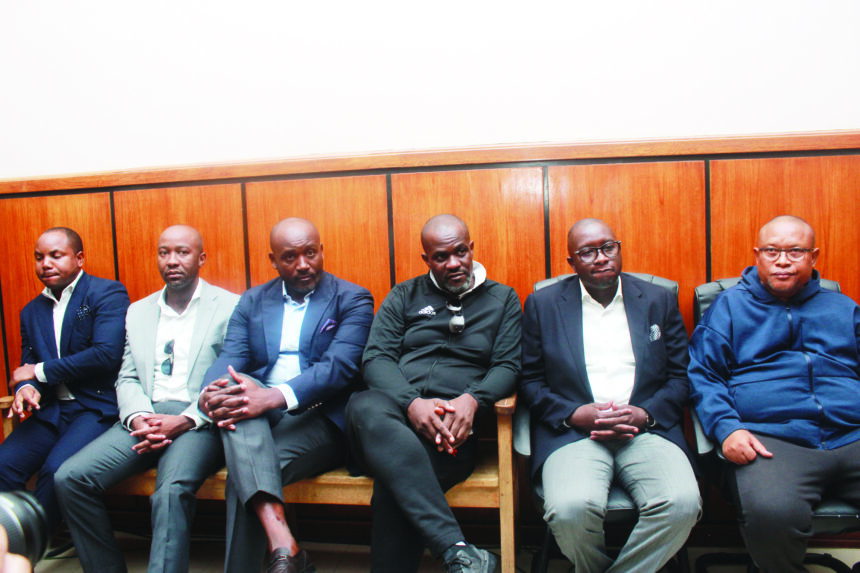Acting High Court Judge Moses Chinhengo yesterday said the ‘Fishrot’ trial will continue on 2 September, even if some of the accused do not have defence lawyers.
Dubbed ‘Fishrot’, the trial involves former Cabinet ministers Bernard Esau and Sacky Shanghala as well as several top businessmen.
While some of the accused indicated they were not ready for trial, the presiding judge was adamant that the trial should
start.
Judge Chinhengo said while the main trial was supposed to have started on 2 October 2023, it was halted and delayed by a barrage of applications by the accused persons.
It is their right to bring as many applications as they wish, but it does not mean the trial may not continue, the judge said. “It may well be that one or more of the applications will direct the trial to be halted, but until such a result has been secured, this court is entitled and obliged to proceed with the trial in the interest of the administration of justice”, he emphasised.
With regards to the unrepresented accused, he said there is no absolute right to be represented by a specific legal practitioner, and there will be no irreparable prejudice on the unrepresented accused should they plead to the remaining charges.
Esau, Shanghala, Ricardo Gustavo, James Hatuikulipi, Pius Mwatelulo, Tamson Hatuikulipi, former Fishcor CEO Mike Nghipunya, Otneel Shuudifonya, Phillipus Mwapopi and minnow Nigel van Wyk are charged with corruptly receiving payments of at least N$300 million to give a competitive advantage to Icelandic fishing company Samherji in securing access to horse mackerel quotas in Namibia.
In the case, it is alleged, Namibia’s fishing resources were stolen on an industrial scale.
They are facing more than 40 counts comprising racketeering, contravening the Anti-Corruption Act, conspiracy, corruptly using an office to receive gratification, fraud, theft, and money laundering, as well as defeating or obstructing the course of justice.
Judge Chinhengo had already started taking pleas, but that exercise was halted in its tracks when Van Wyk lodged a recusal application for the judge, based on perceived potential bias.
That application was dismissed, and a subsequent appeal and petition to the Supreme Court were similarly dismissed.
Shanghala then lodged an application for the reservation of certain questions of law to the Supreme Court, which was also dismissed. An appeal on that dismissal is in the works. Shanghala also applied for directions on how to proceed, which was also dismissed, as the judge believed it was a veiled attempt to get legal advice from the court.
After Judge Chinhengo refused the plea for directions, he told the accused that he wishes to resume the taking of pleas, and asked for dates on which the lawyers and the unrepresented accused would be ready. Only the State, represented by Ed Marondedze and Cliff Lutibezi, and Milton Engelbrecht, who represents Nghipunya, Shuudifonya and Mwapopi, indicated readiness to proceed.
Meanwhile, lawyer Mbanga Siyomunji, who initially indicated that he will only be available from February next year, yesterday reneged, indicating that he will be available during the period 2 to 6 September.
Furthermore, Florin Beukes, who is supposed to represent Esau after the ex-minister succeeded in having part of his assets made available for legal representation, will only be available from next year.
The judge stated that it is the unavailability of the lawyers of the accused which stands in the way of the resumption of the trial, which is unacceptable.
He quoted a judgement from South Africa which said lawyers should not accept instructions if they know they will not be available for the set dates. James Hatuikulipi wanted the trial to start only in January 2026, while Shanghala wants the trial to resume in August 2025. Mwatelulo indicated that he applied for legal aid and is still waiting for an answer, and wants the trial to resume in nine months’ time. Gustavo indicated that he no longer wishes to represent himself and wants to appoint a lawyer of his choice, paid for by the State.
He will lodge an application in this regard in the next few days, he added. Shanghala, James Hatuikulipi and Mwatelulo indicated that they will bring several applications in the coming days, including an appeal against the decision for the reservation of questions of law.
They will also bring applications on the venue of the trial, a review application to the Supreme Court challenging the court’s decision to take pleas from unrepresented accused persons, whether the court is competent under Article 12(1) of the Namibian Constitution, and applications for the High Court to determine the legality and admissibility of information used by the prosecutor general obtained through an unlawful investigation by the Anti-Corruption Commission and foreign authorities in the bail hearings, and the framing of the indictment, and their use at trial.
Shanghala furthermore wanted to know if the court, using its inherent powers, cannot compel the State to pay for the legal representation of the unrepresented accused.
(Fishrot)
Caption:


